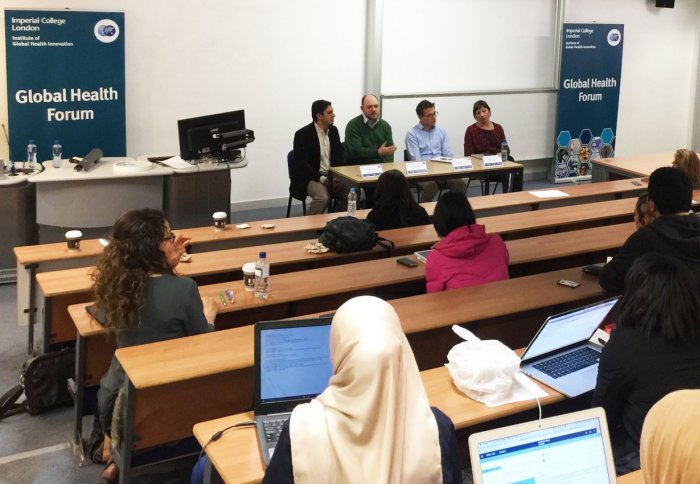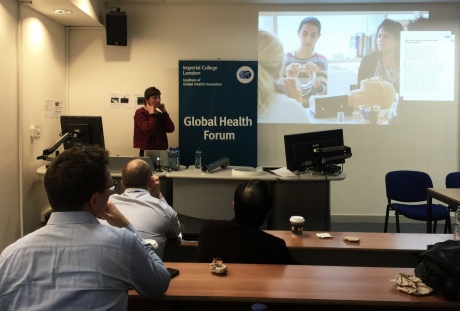How can we create effective yet affordable health innovations?
by Jo Seed

Speakers from IGHI talk frugal innovation during the first ever monthly Global Health Forum.
The Institute of Global Health Innovation (IGHI) host inaugural Global Health Forum with a focus on frugal and reverse innovation.
The Forum, which was chaired by Professor Peter Burney, took place last week in South Kensington to an audience of Imperial students, academics and some visitors.
Our monthly Global Health Forum, which replaces our Non-Communicable Disease Forum, aims to provide a platform to bring together Imperial researchers, students, and staff from across the college to highlight, discuss and disseminate findings on current global health research and innovations. The Forum encourages interdisciplinary discussions with the intention to foster inter-Faculty research initiatives and leverage the immense strengths of Imperial to resolve current global health priorities.
Doing more with less
A very important component of creating health innovations that work, particularly in developing countries, is to create frugal innovations. In other words, creating innovations that are effective, safe, accessible to all and affordable. During the event, the speakers illustrated with the aid of case studies and videos, how they are working towards doing just that.
“Its not just about making money and it’s not just about innovating in different ways. It’s about alleviating poverty and making sure everyone across the world has access to the same things that we have access to in the developed world”
– Dr Yasser Bhatti
Research Fellow, IGHI
Speakers included IGHI’s Research Fellow in Frugal Innovation Dr Yasser Bhatti, who set the context for the Forum around how to think about what frugal innovations are and why they are important. In learning about how innovation is different in other regions and sectors, he provided examples of frugal innovations such as Ratan Tata's Nano Car in India and Muhammad Yunus's microfinance loan schemes in Bangladesh followed by examples in healthcare such as GE's portable ECG machine, Narayana's cardiac surgery, Aravind's cataract surgery, Peek Vision's smart phone based eye diagnostics, and the 3D printed stethoscope.
He also talked about how reverse innovation (adopting innovations from low income countries to a high income context) can and should play a role in the innovation pathway.
“Its not just about making money and it’s not just about innovating in different ways. It’s about alleviating poverty and making sure everyone across the world has access to the same things that we have access to in the developed world” said Dr Bhatti.
Dr Bhatti’s full presentation can be viewed in the video below.
A toolkit for innovators
Matt Prime, PhD Student in Frugal Innovation and Orthopaedic Surgeon at IGHI went on to present his work on developing a toolkit for innovators to create frugal innovations.
In 2012 Matt spent time working in Malawi, one of the world’s poorest countries, he was fascinated to discover how local doctors could provide quality and safe healthcare in such an under-resourced environment. Malawi currently has a population of 16 million people and a GDP of just £3.7 billion, as compared with, St Mary’s Hospital, which has a budget of over £1 billion! The figures speak for themselves.
One clever cost-saving innovation being used in Malawi to reduce the costs of orthopaedic surgery is the application of a sterile bag to house a standard power drill. This compares with specialized surgical drills used in the UK, which can cost as must as £20,000. Matt also addressed how the UK can learn from such innovations in order to save money and make resources go further.
Matt’s full presentation can be viewed in the video below.
Diffusing innovations
IGHI Senior Policy Fellow in Public Health Dr Matthew Harris then addressed the diffusion and dissemination of frugal Innovations and how we can achieve this at scale.
Having previously spent time persuading NHS executives about the merits of the Brazilian Family Health Strategy model of primary care, Matthew described the prevalence of cognitive biases towards learning from other contexts, particularly low- or middle-income countries, and that often get in the way of learning and possible adoption of innovations.
He presented recent research published in BMJ Open and Globalization and Health that demonstrates that, in some instances, researchers can be negatively influenced by the source of a research article. He delved deeper into Reverse Innovation and questioned the barriers and the obstacles to disseminating these innovations effectively by drawing on methods from social psychology.
Watch Matthew’s full presentation in the video below.
Innovations in practice
Lead Designer at HELIX, Maja Kecman, then concluded with a showcase of current projects taking place within IGHI’s HELIX Centre for Design in Healthcare. She used key examples of frugal innovations and outlined how HELIX works to get these innovations from idea to bench and finally to bedside.
A good example of a HELIX frugal innovation would be their new bowel cancer screening toolkit. Currently everyone in the UK between 60 and 74 is invited to participate in the screening programme every two years, but only around 55% of invitees actually participate. The process involves taking a swab sample of your own stool at home and returning them by post. Uptake is particularly low in urban, low-income and immigrant populations.
HELIX is working on improving the experience of bowel cancer screening. This includes a new ‘out of box’ experience when people receive the sample kit, and the development of a series of animated films that explain in accessible, elegant and plain-speaking snippets the reasons for participating, and practical advice on completing the task.
This is one of many ways in which HELIX are contributing towards frugal innovations and finding new ways in which we can globally work together to do more with less.

The event concluded with a panel discussion and a drinks reception.
Further reading
All of the photos from the event can be found on our Flickr pages here.
View the Storify from the event here.
Article text (excluding photos or graphics) © Imperial College London.
Photos and graphics subject to third party copyright used with permission or © Imperial College London.
Reporter
Jo Seed
Institute of Global Health Innovation

